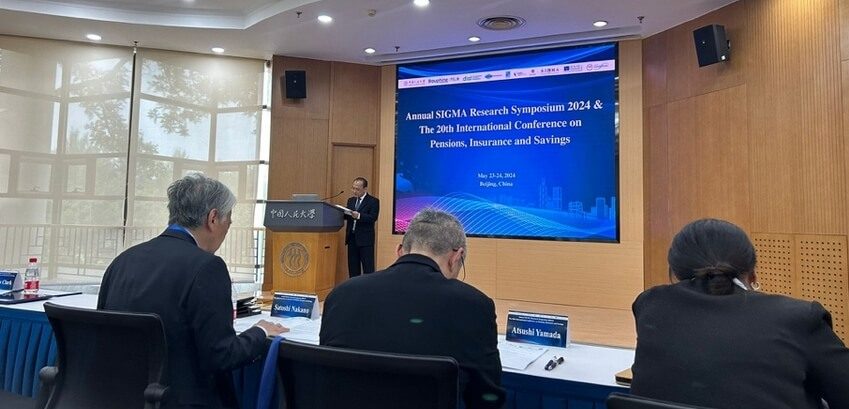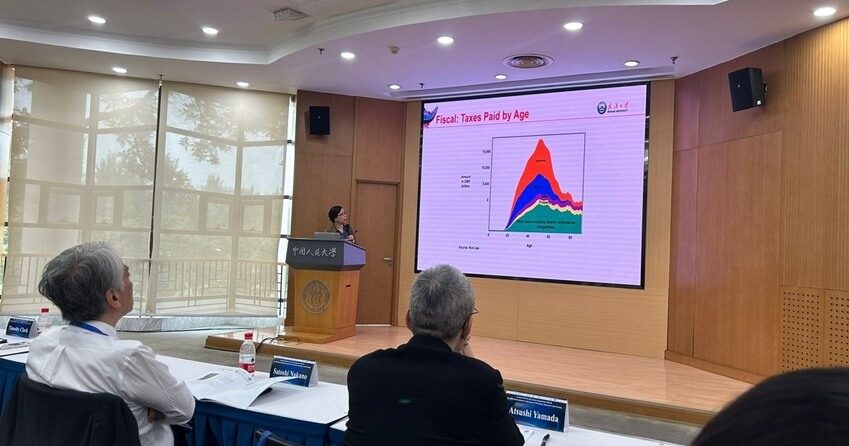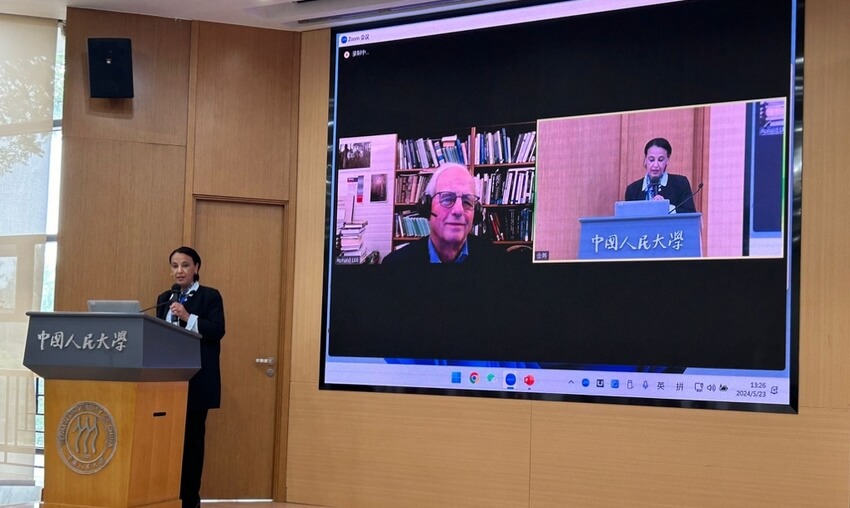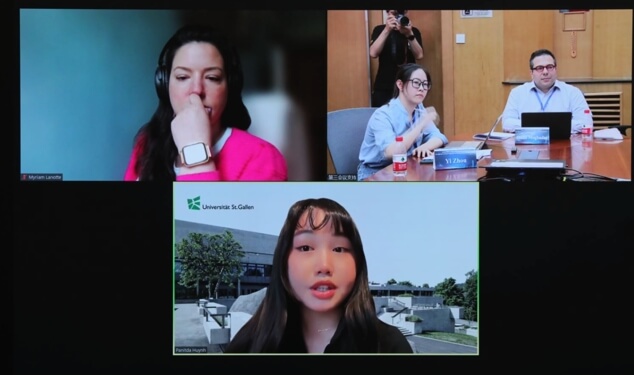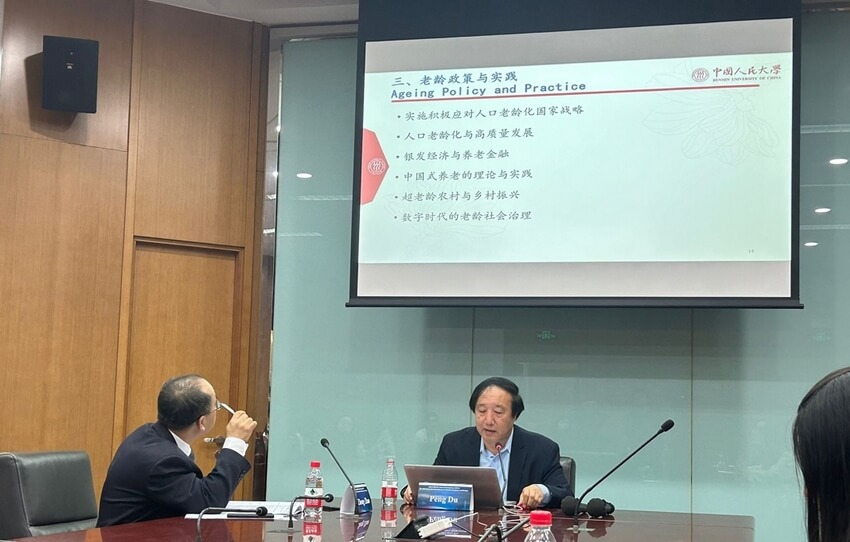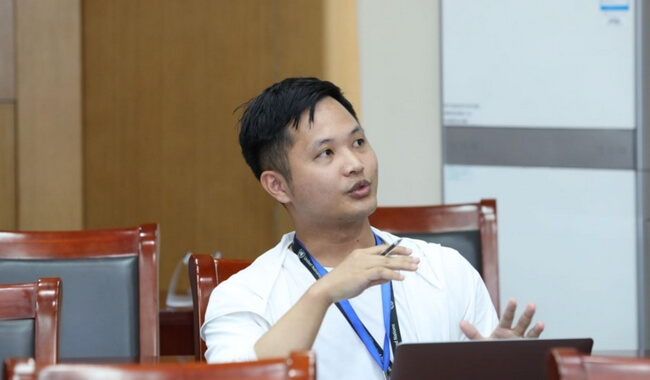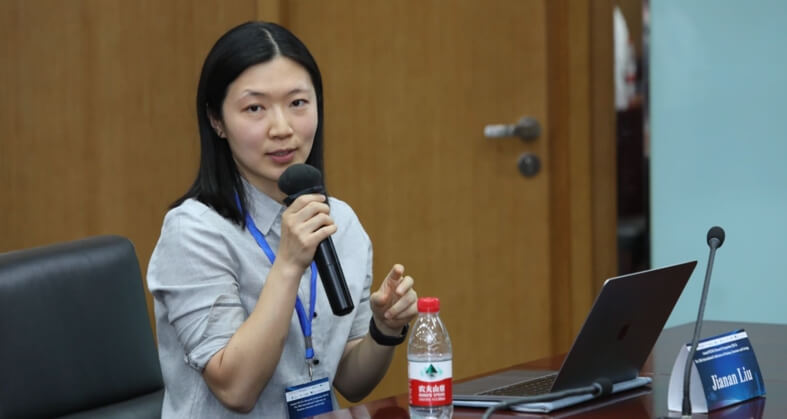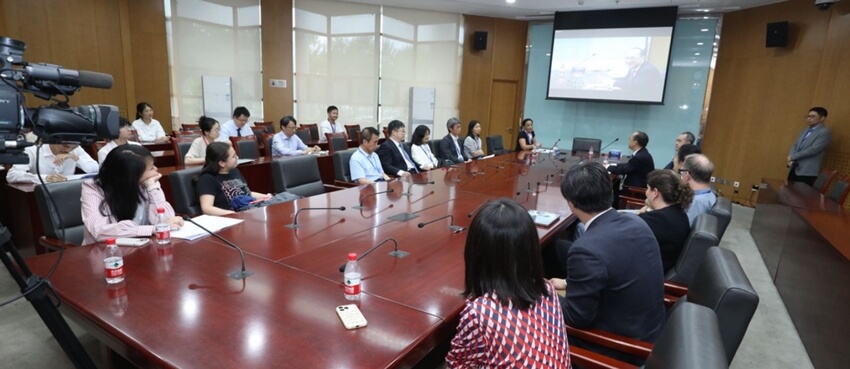
The “Annual SIGMA Research Symposium 2024 & The 20th International Conference on Pensions, Insurance, and Savings” took place at the Renmin University campus in Beijing, China, and was officially opened on May 23rd by Zhong Zhao, Dean of the School of Labor and Human Resources at Renmin University of China, followed by opening remarks from Timothy Clark, President of SIGMA and Provost of Singapore Management University.
The first Keynote of the conference was given by Yaohui Zhao, Professor, Dong Fureng Institute of Economic and Social Development, Wuhan University. The title of the insightful speech was: “Fundamental Scientific Issues in Actively Coping with Population Ageing”.
Highlighting that, for the first time in history, the number of people over 65 surpasses those under 5, she underscored the demographic challenges faced by countries like Japan, the oldest country, with China rapidly approaching similar statistics. Professor Zhao emphasized that in the next 30 years, we will see a reduction in all age groups except for the elderly, presenting significant economic challenges. Older populations contribute less to the economy and require more governmental support, leading to deficits in public financing. Data indicates that countries with the highest ageing populations also have the highest public debt.
Postponing retirement was suggested as a way to improve public finances quickly. But for this to work, ensuring the physical and mental well-being of older people is crucial to enable them to work longer. No country has yet figured out how to guarantee a long and healthy lifespan for its entire population.
Professor Zhao outlined five key research areas to address these challenges:
- Determinants of Health: Factors such as clinical care, social determinants (income, social protection, education, social inclusion, food security, working-life conditions), and structural influences. She highlighted that systems influencing healthy longevity often operate in silos, such as education systems lacking health literacy and disjointed food security and social inclusion efforts.
- Health Behavior: Addressing unhealthy behaviors, improving health literacy, strengthening primary care, and integrating public health with hospital care. She called for a better integration of healthcare services and public health initiatives
- Age-Care Arrangements: There is a transitioning from family-based care to social care,meanwhile it is essential to preserve the function of family care.
- Economic Security at Old Age & Retirement Benefits: The poverty rate among the elderly in China stands at 16%. Urban retirees tend to retire earlier than their rural counterparts. Policy should encourage longer work lives and incentivizing firms to hire older workers.
- Social Security Systems: Developing financially sustainable pension systems that positively impact health outcomes and understanding the interaction between different social security systems.
Professor Zhao underscored the importance of healthy ageing as a key strategy to manage the challenges of a growing elderly population. She stressed the need for a multi-pronged approach, urging collaboration between individuals, healthcare systems, and policymakers. This comprehensive approach should prioritize improving health, extending working lives for those who are able, and ensuring economic security for seniors.
The conference then offered attendees a choice of three parallel sessions.
Session A1: Social Participation of the Elderly
Chaired by Cheng Cheng from Singapore Management University. Presentations included “Active alone or together? Spousal Differences in Social Participation and Life Satisfaction” by Cheng Cheng, followed by “Mechanism Analysis of Social Participation on Health of the Elderly in Beijing” presented by Xueqing Xu from Minzu University of China. Lastly, Paulin Straughan from Singapore Management University discussed “Community Based and Participant-led Initiatives to Increase Civic Engagement Among Older Adults,” with Cheng Cheng serving as the discussant.
Session A2: The Source and Use of Finance
Chaired by Yeganeh Forouheshfar from EMEA & DIAL University Paris Dauphine. This session focused on financial aspects affecting the elderly. Hang Li from Xi’an Jiaotong University presented “Does the venture philanthropy of long-term care system enhance older adults’ service accessibility?” followed by Yun Zhang from Sun Yat-sen University, who discussed “Governmental Health Expenditure and Health Effects.”
Session A3: Ageing in the Workplace
Wei Huang from Renmin University of China chaired this session, which addressed the challenges and innovations in managing an ageing workforce. Presentations included “Managing Workforce Ageing and an Ageing Workforce in China: Innovations and Challenges in Labour Relations Management” by Wei Huang, followed by “A Role Perspective on Flexible Human Resource Practices and Older Workers’ Early Retirement Intention” presented by Jianmin Sun, also from Renmin University of China. Marcela Parada-Contzen from Universidad de Concepción then presented “Revisiting minimum retirement age for an aging population: Evidence from Chile,” with Wei Huang serving as the discussant.
The Plenary Policy Session on “Demographic and Energy Transitions,” chaired by Najat El Mekkaoui from Université Paris Dauphine-PSL LEDa DIAL, brought together prominent experts to discuss the interplay between demographic shifts and energy consumption. The session tackled the fundamental question of how population ageing can affect energy transition? The profound change in global demography have the potential to bring opportunities and challenges for energetic transitions. Context and insights into Japan and China economies were also discussed.
Participants of the session are Najat EL MEKKAOUI (Université Paris Dauphine – PSL), Ronald D. Lee (University of California, Berkeley), Ayako Honda (Hitotsubashi University), Chu Wei (Renmin University of China), Yeganeh Forouheshfar from EMEA & Université Paris-Dauphine.
Ronald D. Lee outlined global population trends, highlighting declining fertility rates and an increasing median age. He noted that labor supply had been growing faster than population growth from 2000 to 2020, and projected a reduction in carbon emissions due to slower GDP growth as the population ages. Ayako Honda discussed Japan’s demographic transition, emphasizing the rise in both life expectancy and healthy life expectancy. She pointed out that a significant number of workers over 65 are in informal employment and addressed the growing burden on Japan’s health system and social security benefits due to the ageing population. Chu Wei presented a framework analyzing the relationship between demographic changes and energy consumption. Through household experiments, he demonstrated that more educated households tend to use more electricity and that behavioral interventions could effectively reduce energy consumption, particularly in middle-income and elderly households. Ronald Lee returned to discuss energy use and policy, questioning how microlevel studies of energy use by age should be interpreted. He highlighted that elderly individuals in high-income countries consume more energy due to higher public transfers and a greater need for heating and cooling. He underscored the complexity of balancing lower carbon emissions from slower growth with higher emissions from increased energy use by the elderly.
Ayako Honda further elaborated on Japan’s energy policy, stressing the focus on nuclear power and renewable energy, and the vulnerability of the elderly to global warming. Chu Wei emphasized the importance of international comparisons using standardized systems, discussing energy poverty and quality, and the potential of the elderly as drivers of energy transition due to their experience, also the importance of future developments in the area of production of clean energy rather than reducing energy consumption. Finally, Yeganeh Forouheshfar underscored the reality of an ageing population and the necessity of promoting healthy ageing, particularly brain health (at the heart of EMEA activity through brain Capital Dashboard and brain capital alliance). She highlighted the importance of adopting policies that allow us to simultaneously promote healthy ageing and climate change in the current context of ageing societies and climate urgency.
Najat El Mekkaoui wrapped up the session by emphasizing the importance of comprehensively examining how demographic shifts impact energy consumption. She underscored the need for integrated policy responses to guarantee sustainable development in the face of these changes.
The conference continued with the 2 rounds of afternoon parallel sessions:
Session B1: Pension and Income Distribution
Chaired by Satoshi Nakano from Hitotsubashi University. This session delved into the complexities of wealth distribution and social protection for the elderly. The session began with Markus Knell from the Central Bank of Austria presenting “The size and distribution of augmented wealth – A look at Austria and beyond,” followed by Selin Pelek from Galatasaray University, who discussed “Social Protection for the Elderly and Inter-household Transfers in Turkey: An Empirical Analysis Based on Panel Data.” Chuanqi Que from the Chinese University of Hong Kong then presented “Crowding in or out? National public pension, inter-generational contract, and family support to empty-nest older parents in rural China,” with Markus Knell serving as the discussant.
Session B2: Physical and Mental Health
Chaired by Joan Rodon from ESADE. This session focused on the well-being of older adults. The first presentation was “Stability of Life Satisfaction in Singaporean Older Adults” by William Tov from Singapore Management University (online), followed by Hao Li from Xi’an Jiaotong University discussing “The Impact of Son Preference on Female Frailty in Old Age: Gender Disparities in Health Investment as Moderators,” with Zeyang Chen from Renmin University of China as the discussant.
Session B3: Ageing from a Spatial Perspective
Chaired by Mengting Li from Renmin University of China. This session explored “Ageing from a Spatial Perspective” and was chaired by Mengting Li from Renmin University of China. The session began with Mengting Li presenting “Age at Migration and Cognitive Function among Older Chinese Americans: The Roles of Acculturation and Social Engagement,” followed by Wenyu Li from Trinity College Dublin, The University of Dublin, discussing “Exploring the impact of population migration on family aged care,” with Mengting Li serving as the discussant.
Session C1: Pension Sustainability
Chaired by Jorge Miguel Bravo from Universidade Nova de Lisboa. This session, focusing on the sustainability of pension systems. Weibin Li from Sun Yat-Sen University presented “Cointegration analysis of China’s Basic Social Pension and Total Fertility Rate,” with Eduard Ponds from Tilburg University (online) serving as the discussant. Next, Eduard Ponds presented “Public pension plans and a fair allocation of longevity gains – Evidence for 17 OECD countries,” followed by Carlos Madeira from the Bank for International Settlements and Central Bank of Chile (online) discussing “The effect of the Covid pension withdrawals and the Universal Guaranteed Pension on the income of the future retirees and its fiscal costs.”
Session C2: Information and Technology
Chaired by Omid Moghadas from Université Paris Dauphine-PSL. This session explored the role of information and communication technology (ICT) in elder care. The session began with Omid Moghadas presenting “How can ICT help to alleviate the loneliness of elderly which are helped by professional caregivers at home? A systematic review of the literature,” followed by Yi Zhou from the University of Manchester discussing “Motivations for Technology Adoption among the Elderly and the Role of Stakeholders: A Semi-Systematic literature review,” with Panitda Huynh from the University of St. Gallen (online) as the discussant. Panitda Huynh then presented “Digital Heath Technologies for Metabolic Disorders in Older Adults: A Scoping Review Protocol,” and Myriam Lanotte from Université Catholique de Louvain (online) discussed “Strengthening accountability and initiative in pension planning through digital pension communications: A multidisciplinary research.”
Session C3: Pension and Financial Transfers
Chaired by Bernard H. Casey from SOCial ECONomic RESearch. This session, which examined the financial aspects of pension systems. The session began with Bernard H. Casey presenting “Cashing out pension savings: an appropriate response to ‘temporary’ income shortfalls?” followed by Qixin Cai from Renmin University of China & University of Pennsylvania discussing “Does Family Structure Matter? Intergenerational Reciprocity, Old-age Poverty Risks, and Their Implications for Subjective Well-being: Evidence from an Indian National Representative Survey,” with Bernard H. Casey serving as the discussant. Then, Bernard H. Casey presented “The contribution of pension funds to financing climate transition,” followed by Misozi Mwanza from the University of Stellenbosch (online) discussing “Unlocking Economic Security: Women and Micro Pensions in Zambia,” with Bernard H. Casey as the discussant.
The keynote session during the second day was given by Director Peng Du from the Institute of Gerontology at Renmin University of China. He focused on a broad analysis of China’s population trends and aging policies. Key statistics revealed that the proportion of elderly people in China peaked between 2000 and 2005. Interestingly, projections suggest this percentage will hold steady at around 50%. Furthermore, China’s elderly population is expected to continue growing, with a negative annual net growth rate only predicted for 2052 onwards. To proactively address these challenges, China implemented a national strategy since 2006, initially targeting elderly individuals without familial support, which later expanded to encompass all elderly citizens. As the population is projected to rise to 100 million, with 300 million elderly individuals, policy initiatives focus on modernization and technological integration to support the labour force.
Key policy aspects include a focus on the distribution of the labour force, addressing issues such as the concentration of labour in coastal areas and the phenomenon of elderly parents being left behind in rural areas. The overarching target is to achieve human development and prosperity, emphasizing high-quality development. The national elderly care program offers 16 distinct services, with provisions for third-party entities such as NGOs and private organizations. The government plans to monitor service provision to assess reforms and has introduced measures such as cultural programs, tourism initiatives, and AI tools to enhance the health and well-being of the elderly.
Evaluation mechanisms involve various ministries and authorities, with pilot programs transitioning into national initiatives. The long-term care insurance system, piloted in 2016, has shown positive results, benefiting two million people, with plans to expand nationally. Additional considerations include assessing elderly satisfaction and safety levels, promoting digital inclusiveness and equity, and leveraging the “silver economy” for economic growth. As rural areas face challenges with “super ageing,” digital literacy among the elderly and their active engagement in social media present opportunities for revenue generation.
Overall, the speaker highlighted the need for a multifaceted approach to crafting successful aging policies in China. This approach emphasizes developing holistic strategies that address the diverse requirements of their growing elderly population.
The conference continued with the following three parallel sessions:
Session D1: Family and Community Support
Chaired by Lin Lin from Renmin University of China, the session started with a paper by its chair, entitled “The More Siblings, the Less Burden? The Effects of Family Size and Birth Order on the Old-age Support of Children”. Jianan Liu, also from Renmin University of China, delves into “Money for Him but Books for Her: The Impact of Children’s Gender and Adulthood on Household Savings in China,” examining the influence of children’s gender and adulthood on household savings and expenditure.
Session D2: Social Isolation and Integration
Moderated by Yi Wen Tan from Singapore Management University, the first presentation by Yi Wen Tan herself explored “A causal discovery exploration of determinants of social isolation,” followed by Omid Moghadas from Université Paris Dauphine-PSL, who investigated “How professional caregivers help the elderly with loss of autonomy to cope with loneliness.” Peng Wu from Xi’an Jiaotong University then presented “The impact of digital social integration on life satisfaction among Chinese older adults: Does employment status matter?”
Session D3: Trust Mechanisms in Ageing Societies
Chaired by Xiangshun Ding from Renmin University of China, the presentations include “The development of Japanese trust law in addressing the aging issue” by Masayuki Tamaruya from Tokyo University, “The property management function of trusts and the effective utilization of trustee assets” by Thomas P. Gallanis from George Mason University, and “The Origin of Anglo-American Trust Law and Civil Trust” by Lusina Ho from Hong Kong University. Additionally, Ye Zhu from Shizuoka University presents “Addressing Aging Issues Through the Integration of Digital Technology and Trust Mechanisms,” while Xiangshun Ding concludes with “Returning to the Origins of Trusts and Addressing China’s Aging Society Through Trusts.” The session includes discussions from Xianming Li, Zhicheng Wu, and Huiwen Li.
Following the four rounds of parallel sessions, the conference concluded with closing remarks and thanks of Fei Wang, and Zhong Zhao and Najat El Mekkaoui to attendees, keynote speakers, and gracious hosts and sponsors. The theme and location for the next conference will be announced at a later date.


